Municipal Law | Assignment
VerifiedAdded on 2022/08/29
|7
|1574
|20
AI Summary
Contribute Materials
Your contribution can guide someone’s learning journey. Share your
documents today.
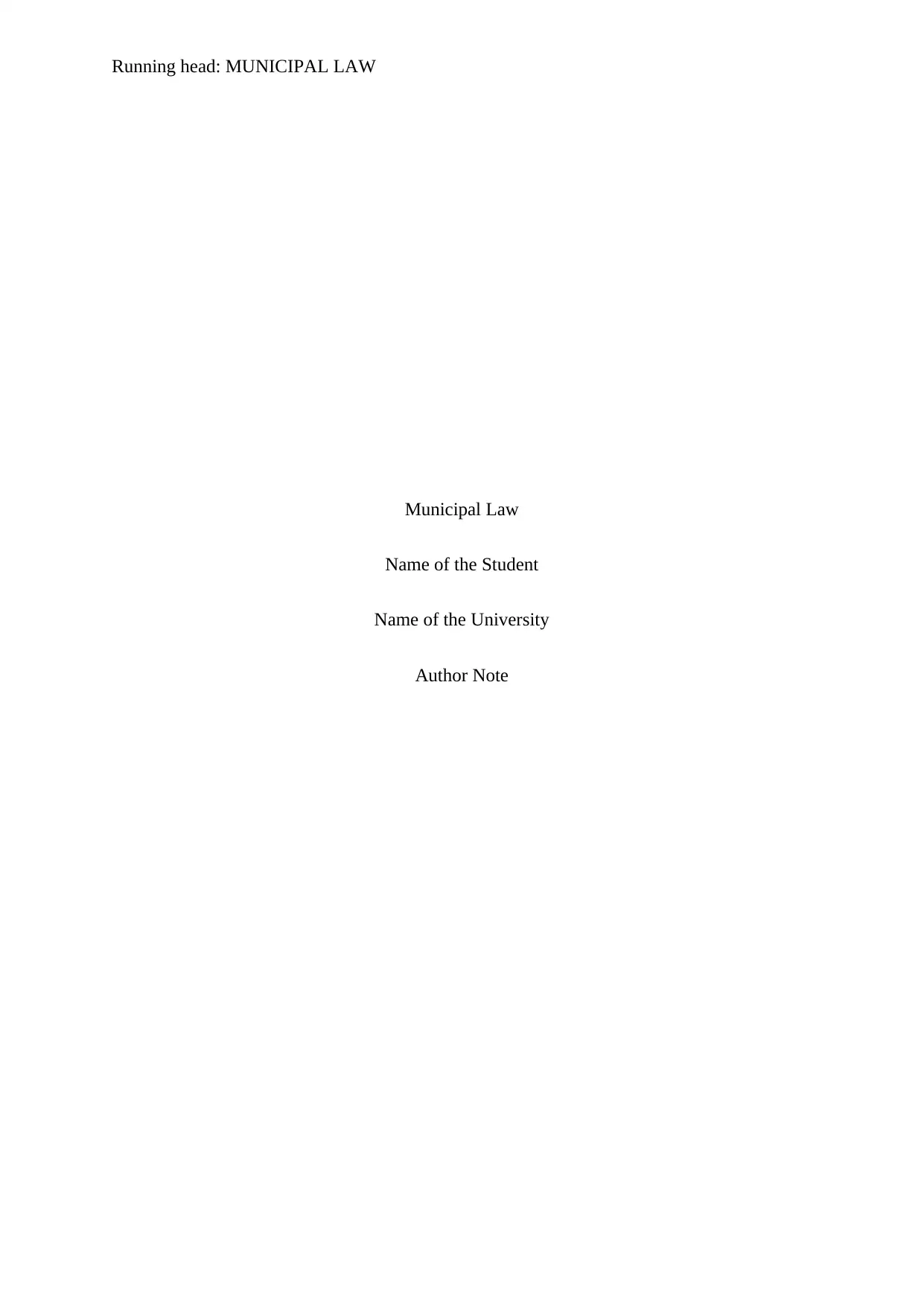
Running head: MUNICIPAL LAW
Municipal Law
Name of the Student
Name of the University
Author Note
Municipal Law
Name of the Student
Name of the University
Author Note
Secure Best Marks with AI Grader
Need help grading? Try our AI Grader for instant feedback on your assignments.
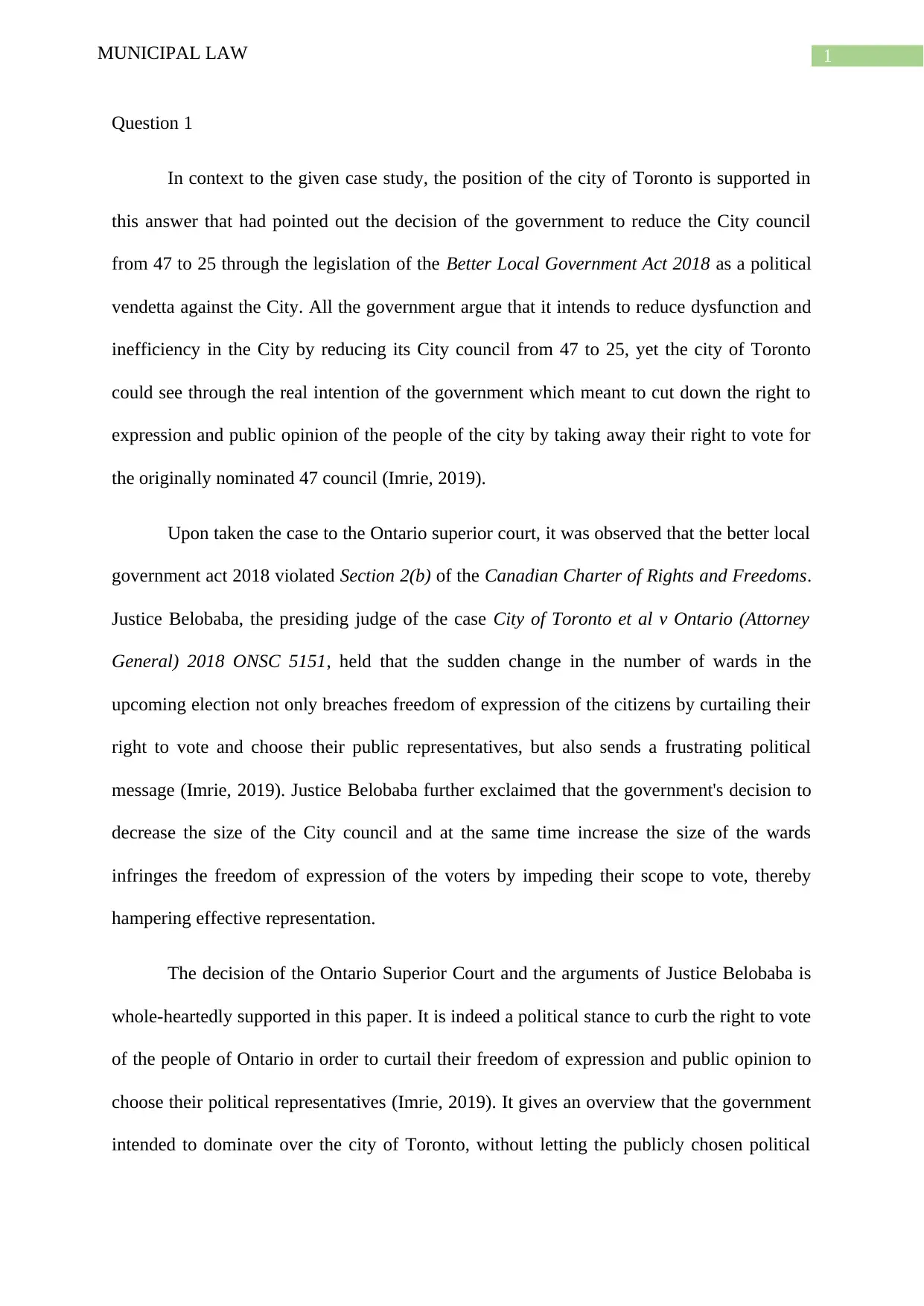
1MUNICIPAL LAW
Question 1
In context to the given case study, the position of the city of Toronto is supported in
this answer that had pointed out the decision of the government to reduce the City council
from 47 to 25 through the legislation of the Better Local Government Act 2018 as a political
vendetta against the City. All the government argue that it intends to reduce dysfunction and
inefficiency in the City by reducing its City council from 47 to 25, yet the city of Toronto
could see through the real intention of the government which meant to cut down the right to
expression and public opinion of the people of the city by taking away their right to vote for
the originally nominated 47 council (Imrie, 2019).
Upon taken the case to the Ontario superior court, it was observed that the better local
government act 2018 violated Section 2(b) of the Canadian Charter of Rights and Freedoms.
Justice Belobaba, the presiding judge of the case City of Toronto et al v Ontario (Attorney
General) 2018 ONSC 5151, held that the sudden change in the number of wards in the
upcoming election not only breaches freedom of expression of the citizens by curtailing their
right to vote and choose their public representatives, but also sends a frustrating political
message (Imrie, 2019). Justice Belobaba further exclaimed that the government's decision to
decrease the size of the City council and at the same time increase the size of the wards
infringes the freedom of expression of the voters by impeding their scope to vote, thereby
hampering effective representation.
The decision of the Ontario Superior Court and the arguments of Justice Belobaba is
whole-heartedly supported in this paper. It is indeed a political stance to curb the right to vote
of the people of Ontario in order to curtail their freedom of expression and public opinion to
choose their political representatives (Imrie, 2019). It gives an overview that the government
intended to dominate over the city of Toronto, without letting the publicly chosen political
Question 1
In context to the given case study, the position of the city of Toronto is supported in
this answer that had pointed out the decision of the government to reduce the City council
from 47 to 25 through the legislation of the Better Local Government Act 2018 as a political
vendetta against the City. All the government argue that it intends to reduce dysfunction and
inefficiency in the City by reducing its City council from 47 to 25, yet the city of Toronto
could see through the real intention of the government which meant to cut down the right to
expression and public opinion of the people of the city by taking away their right to vote for
the originally nominated 47 council (Imrie, 2019).
Upon taken the case to the Ontario superior court, it was observed that the better local
government act 2018 violated Section 2(b) of the Canadian Charter of Rights and Freedoms.
Justice Belobaba, the presiding judge of the case City of Toronto et al v Ontario (Attorney
General) 2018 ONSC 5151, held that the sudden change in the number of wards in the
upcoming election not only breaches freedom of expression of the citizens by curtailing their
right to vote and choose their public representatives, but also sends a frustrating political
message (Imrie, 2019). Justice Belobaba further exclaimed that the government's decision to
decrease the size of the City council and at the same time increase the size of the wards
infringes the freedom of expression of the voters by impeding their scope to vote, thereby
hampering effective representation.
The decision of the Ontario Superior Court and the arguments of Justice Belobaba is
whole-heartedly supported in this paper. It is indeed a political stance to curb the right to vote
of the people of Ontario in order to curtail their freedom of expression and public opinion to
choose their political representatives (Imrie, 2019). It gives an overview that the government
intended to dominate over the city of Toronto, without letting the publicly chosen political
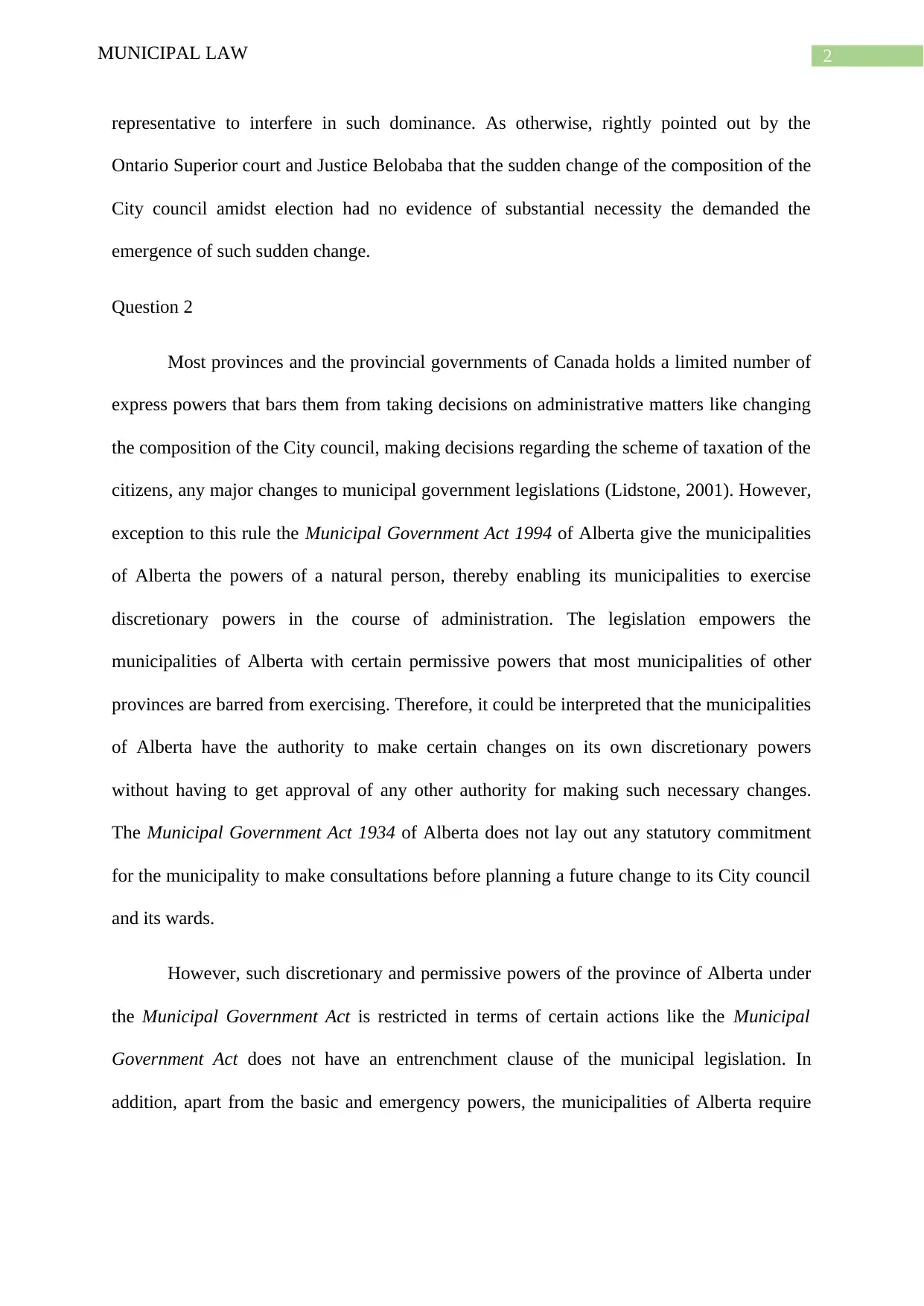
2MUNICIPAL LAW
representative to interfere in such dominance. As otherwise, rightly pointed out by the
Ontario Superior court and Justice Belobaba that the sudden change of the composition of the
City council amidst election had no evidence of substantial necessity the demanded the
emergence of such sudden change.
Question 2
Most provinces and the provincial governments of Canada holds a limited number of
express powers that bars them from taking decisions on administrative matters like changing
the composition of the City council, making decisions regarding the scheme of taxation of the
citizens, any major changes to municipal government legislations (Lidstone, 2001). However,
exception to this rule the Municipal Government Act 1994 of Alberta give the municipalities
of Alberta the powers of a natural person, thereby enabling its municipalities to exercise
discretionary powers in the course of administration. The legislation empowers the
municipalities of Alberta with certain permissive powers that most municipalities of other
provinces are barred from exercising. Therefore, it could be interpreted that the municipalities
of Alberta have the authority to make certain changes on its own discretionary powers
without having to get approval of any other authority for making such necessary changes.
The Municipal Government Act 1934 of Alberta does not lay out any statutory commitment
for the municipality to make consultations before planning a future change to its City council
and its wards.
However, such discretionary and permissive powers of the province of Alberta under
the Municipal Government Act is restricted in terms of certain actions like the Municipal
Government Act does not have an entrenchment clause of the municipal legislation. In
addition, apart from the basic and emergency powers, the municipalities of Alberta require
representative to interfere in such dominance. As otherwise, rightly pointed out by the
Ontario Superior court and Justice Belobaba that the sudden change of the composition of the
City council amidst election had no evidence of substantial necessity the demanded the
emergence of such sudden change.
Question 2
Most provinces and the provincial governments of Canada holds a limited number of
express powers that bars them from taking decisions on administrative matters like changing
the composition of the City council, making decisions regarding the scheme of taxation of the
citizens, any major changes to municipal government legislations (Lidstone, 2001). However,
exception to this rule the Municipal Government Act 1994 of Alberta give the municipalities
of Alberta the powers of a natural person, thereby enabling its municipalities to exercise
discretionary powers in the course of administration. The legislation empowers the
municipalities of Alberta with certain permissive powers that most municipalities of other
provinces are barred from exercising. Therefore, it could be interpreted that the municipalities
of Alberta have the authority to make certain changes on its own discretionary powers
without having to get approval of any other authority for making such necessary changes.
The Municipal Government Act 1934 of Alberta does not lay out any statutory commitment
for the municipality to make consultations before planning a future change to its City council
and its wards.
However, such discretionary and permissive powers of the province of Alberta under
the Municipal Government Act is restricted in terms of certain actions like the Municipal
Government Act does not have an entrenchment clause of the municipal legislation. In
addition, apart from the basic and emergency powers, the municipalities of Alberta require
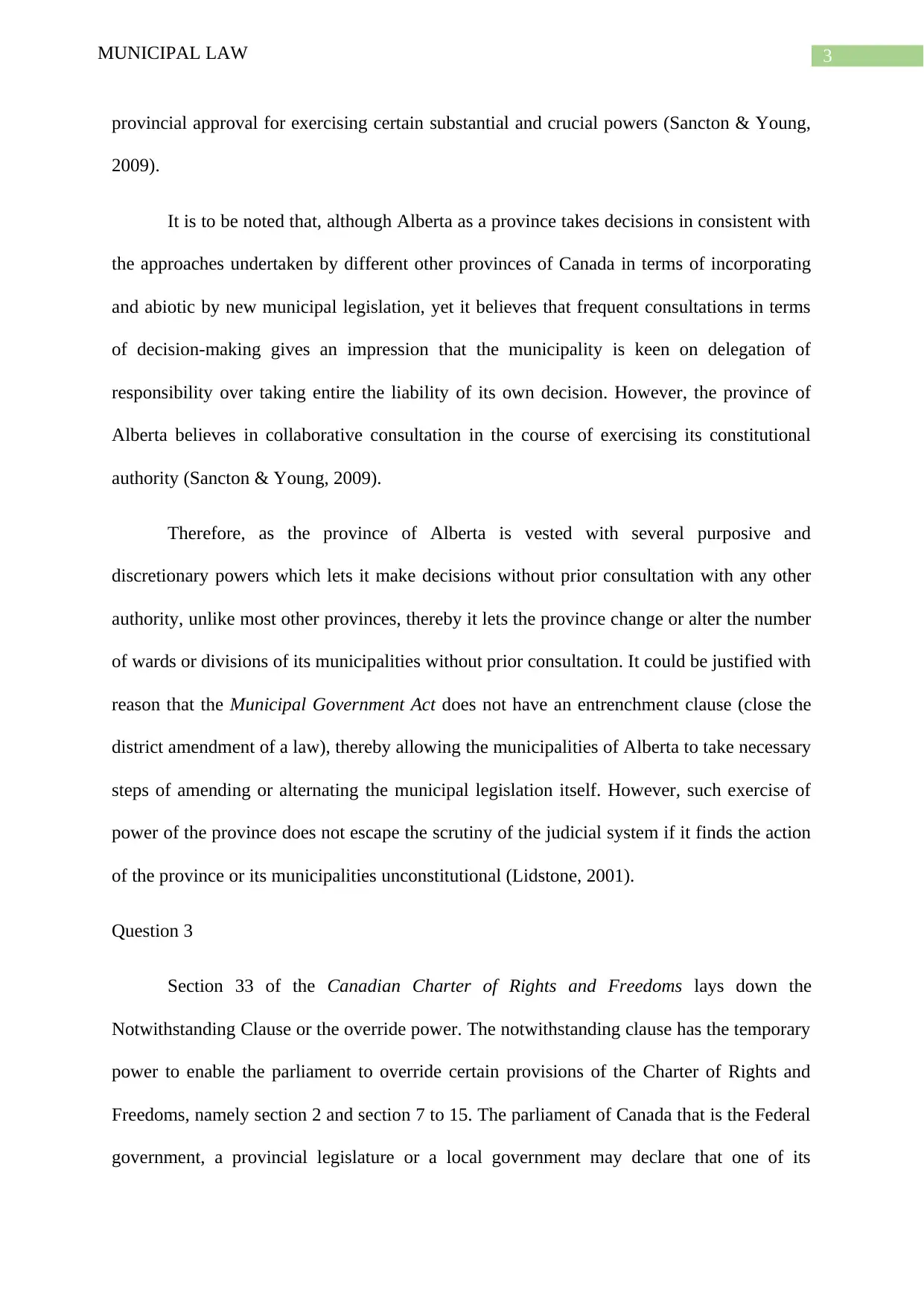
3MUNICIPAL LAW
provincial approval for exercising certain substantial and crucial powers (Sancton & Young,
2009).
It is to be noted that, although Alberta as a province takes decisions in consistent with
the approaches undertaken by different other provinces of Canada in terms of incorporating
and abiotic by new municipal legislation, yet it believes that frequent consultations in terms
of decision-making gives an impression that the municipality is keen on delegation of
responsibility over taking entire the liability of its own decision. However, the province of
Alberta believes in collaborative consultation in the course of exercising its constitutional
authority (Sancton & Young, 2009).
Therefore, as the province of Alberta is vested with several purposive and
discretionary powers which lets it make decisions without prior consultation with any other
authority, unlike most other provinces, thereby it lets the province change or alter the number
of wards or divisions of its municipalities without prior consultation. It could be justified with
reason that the Municipal Government Act does not have an entrenchment clause (close the
district amendment of a law), thereby allowing the municipalities of Alberta to take necessary
steps of amending or alternating the municipal legislation itself. However, such exercise of
power of the province does not escape the scrutiny of the judicial system if it finds the action
of the province or its municipalities unconstitutional (Lidstone, 2001).
Question 3
Section 33 of the Canadian Charter of Rights and Freedoms lays down the
Notwithstanding Clause or the override power. The notwithstanding clause has the temporary
power to enable the parliament to override certain provisions of the Charter of Rights and
Freedoms, namely section 2 and section 7 to 15. The parliament of Canada that is the Federal
government, a provincial legislature or a local government may declare that one of its
provincial approval for exercising certain substantial and crucial powers (Sancton & Young,
2009).
It is to be noted that, although Alberta as a province takes decisions in consistent with
the approaches undertaken by different other provinces of Canada in terms of incorporating
and abiotic by new municipal legislation, yet it believes that frequent consultations in terms
of decision-making gives an impression that the municipality is keen on delegation of
responsibility over taking entire the liability of its own decision. However, the province of
Alberta believes in collaborative consultation in the course of exercising its constitutional
authority (Sancton & Young, 2009).
Therefore, as the province of Alberta is vested with several purposive and
discretionary powers which lets it make decisions without prior consultation with any other
authority, unlike most other provinces, thereby it lets the province change or alter the number
of wards or divisions of its municipalities without prior consultation. It could be justified with
reason that the Municipal Government Act does not have an entrenchment clause (close the
district amendment of a law), thereby allowing the municipalities of Alberta to take necessary
steps of amending or alternating the municipal legislation itself. However, such exercise of
power of the province does not escape the scrutiny of the judicial system if it finds the action
of the province or its municipalities unconstitutional (Lidstone, 2001).
Question 3
Section 33 of the Canadian Charter of Rights and Freedoms lays down the
Notwithstanding Clause or the override power. The notwithstanding clause has the temporary
power to enable the parliament to override certain provisions of the Charter of Rights and
Freedoms, namely section 2 and section 7 to 15. The parliament of Canada that is the Federal
government, a provincial legislature or a local government may declare that one of its
Secure Best Marks with AI Grader
Need help grading? Try our AI Grader for instant feedback on your assignments.
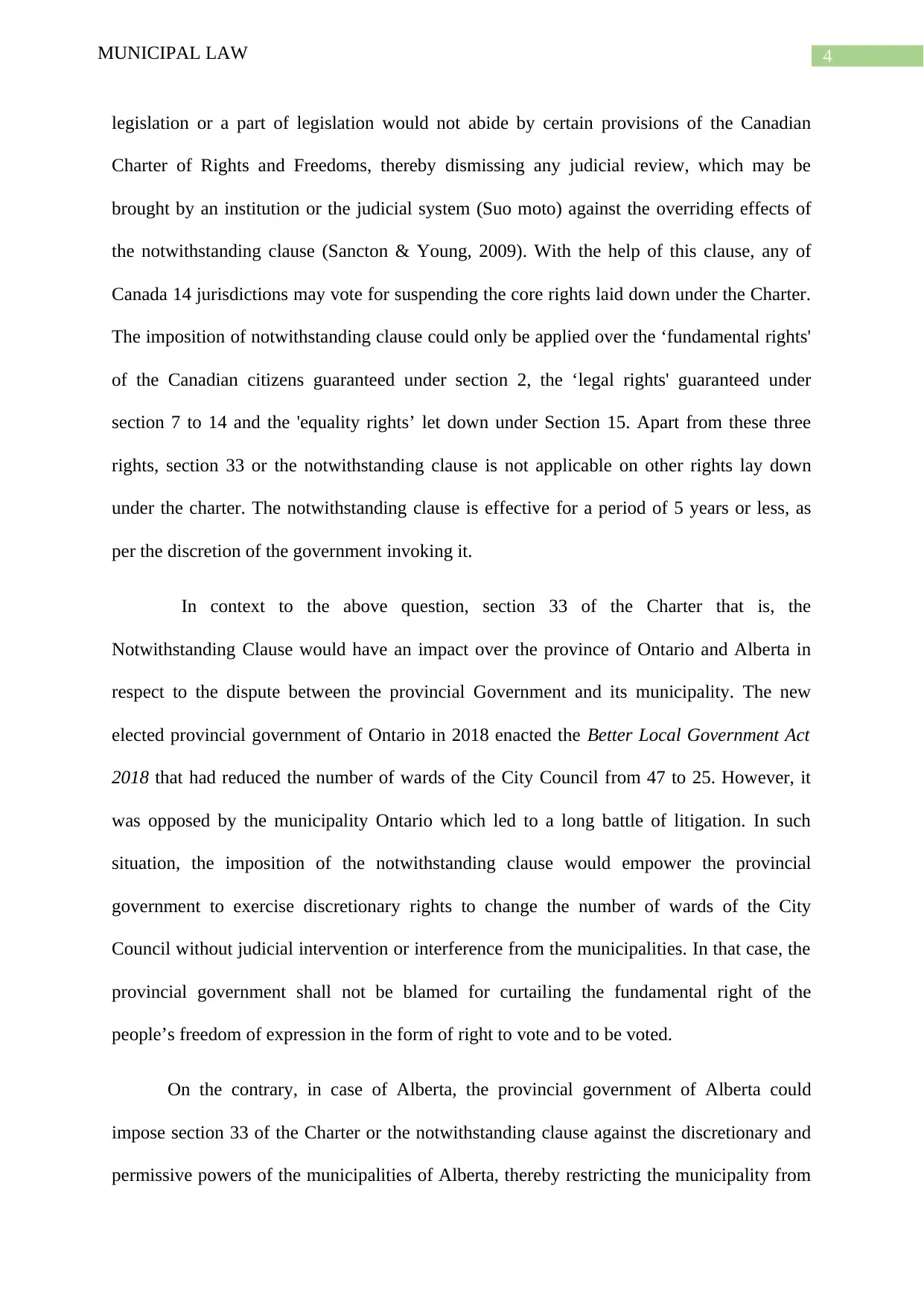
4MUNICIPAL LAW
legislation or a part of legislation would not abide by certain provisions of the Canadian
Charter of Rights and Freedoms, thereby dismissing any judicial review, which may be
brought by an institution or the judicial system (Suo moto) against the overriding effects of
the notwithstanding clause (Sancton & Young, 2009). With the help of this clause, any of
Canada 14 jurisdictions may vote for suspending the core rights laid down under the Charter.
The imposition of notwithstanding clause could only be applied over the ‘fundamental rights'
of the Canadian citizens guaranteed under section 2, the ‘legal rights' guaranteed under
section 7 to 14 and the 'equality rights’ let down under Section 15. Apart from these three
rights, section 33 or the notwithstanding clause is not applicable on other rights lay down
under the charter. The notwithstanding clause is effective for a period of 5 years or less, as
per the discretion of the government invoking it.
In context to the above question, section 33 of the Charter that is, the
Notwithstanding Clause would have an impact over the province of Ontario and Alberta in
respect to the dispute between the provincial Government and its municipality. The new
elected provincial government of Ontario in 2018 enacted the Better Local Government Act
2018 that had reduced the number of wards of the City Council from 47 to 25. However, it
was opposed by the municipality Ontario which led to a long battle of litigation. In such
situation, the imposition of the notwithstanding clause would empower the provincial
government to exercise discretionary rights to change the number of wards of the City
Council without judicial intervention or interference from the municipalities. In that case, the
provincial government shall not be blamed for curtailing the fundamental right of the
people’s freedom of expression in the form of right to vote and to be voted.
On the contrary, in case of Alberta, the provincial government of Alberta could
impose section 33 of the Charter or the notwithstanding clause against the discretionary and
permissive powers of the municipalities of Alberta, thereby restricting the municipality from
legislation or a part of legislation would not abide by certain provisions of the Canadian
Charter of Rights and Freedoms, thereby dismissing any judicial review, which may be
brought by an institution or the judicial system (Suo moto) against the overriding effects of
the notwithstanding clause (Sancton & Young, 2009). With the help of this clause, any of
Canada 14 jurisdictions may vote for suspending the core rights laid down under the Charter.
The imposition of notwithstanding clause could only be applied over the ‘fundamental rights'
of the Canadian citizens guaranteed under section 2, the ‘legal rights' guaranteed under
section 7 to 14 and the 'equality rights’ let down under Section 15. Apart from these three
rights, section 33 or the notwithstanding clause is not applicable on other rights lay down
under the charter. The notwithstanding clause is effective for a period of 5 years or less, as
per the discretion of the government invoking it.
In context to the above question, section 33 of the Charter that is, the
Notwithstanding Clause would have an impact over the province of Ontario and Alberta in
respect to the dispute between the provincial Government and its municipality. The new
elected provincial government of Ontario in 2018 enacted the Better Local Government Act
2018 that had reduced the number of wards of the City Council from 47 to 25. However, it
was opposed by the municipality Ontario which led to a long battle of litigation. In such
situation, the imposition of the notwithstanding clause would empower the provincial
government to exercise discretionary rights to change the number of wards of the City
Council without judicial intervention or interference from the municipalities. In that case, the
provincial government shall not be blamed for curtailing the fundamental right of the
people’s freedom of expression in the form of right to vote and to be voted.
On the contrary, in case of Alberta, the provincial government of Alberta could
impose section 33 of the Charter or the notwithstanding clause against the discretionary and
permissive powers of the municipalities of Alberta, thereby restricting the municipality from
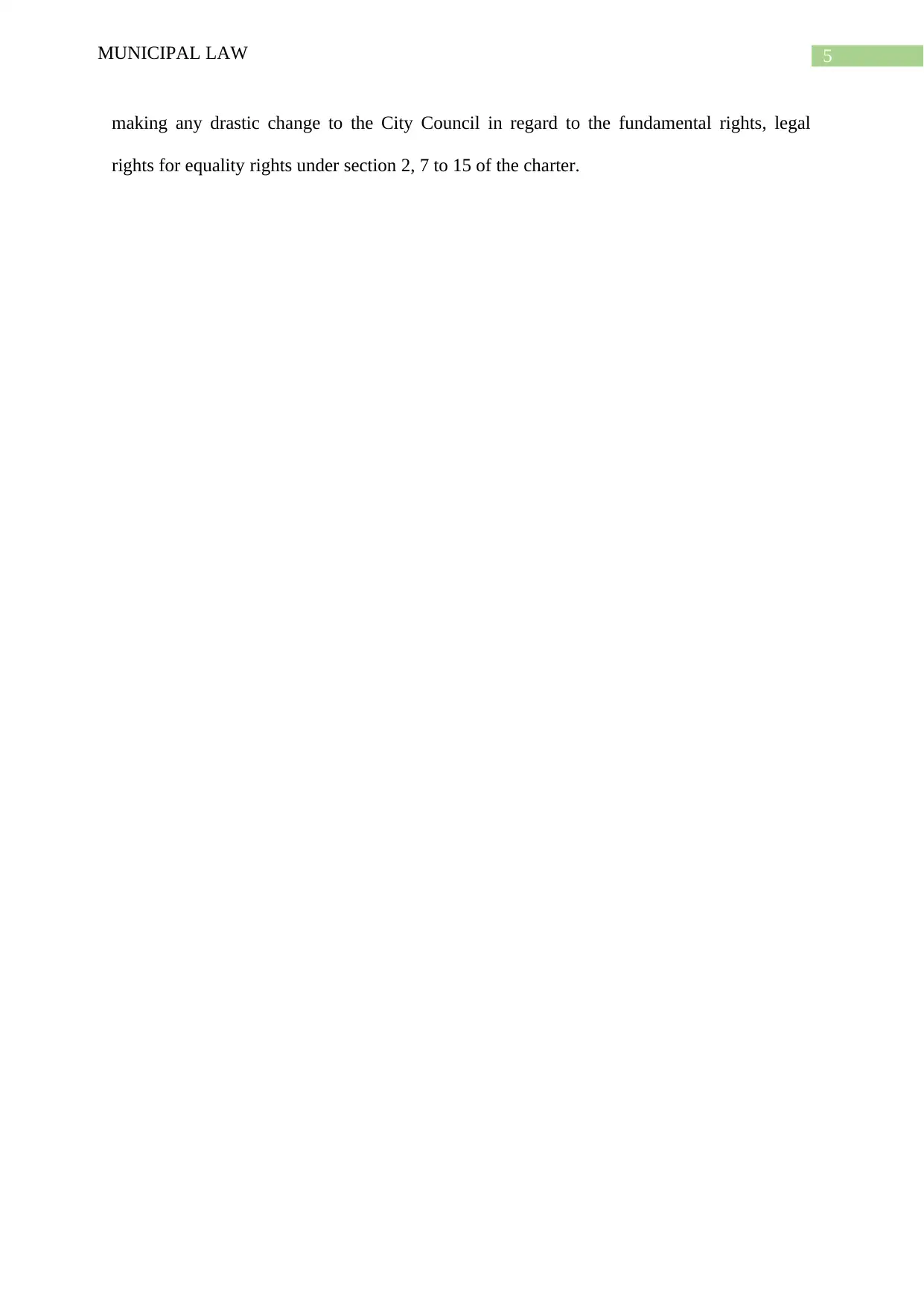
5MUNICIPAL LAW
making any drastic change to the City Council in regard to the fundamental rights, legal
rights for equality rights under section 2, 7 to 15 of the charter.
making any drastic change to the City Council in regard to the fundamental rights, legal
rights for equality rights under section 2, 7 to 15 of the charter.
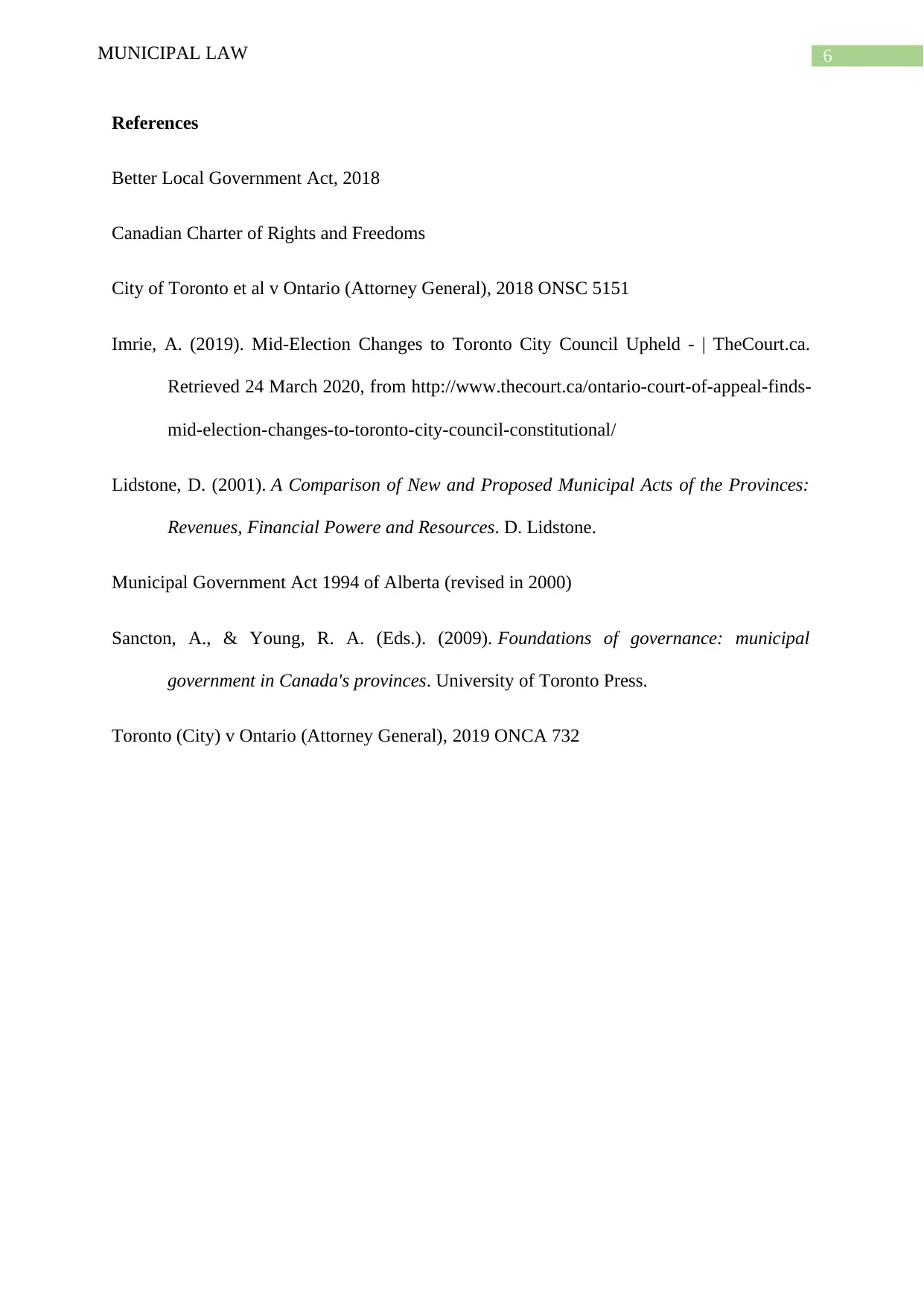
6MUNICIPAL LAW
References
Better Local Government Act, 2018
Canadian Charter of Rights and Freedoms
City of Toronto et al v Ontario (Attorney General), 2018 ONSC 5151
Imrie, A. (2019). Mid-Election Changes to Toronto City Council Upheld - | TheCourt.ca.
Retrieved 24 March 2020, from http://www.thecourt.ca/ontario-court-of-appeal-finds-
mid-election-changes-to-toronto-city-council-constitutional/
Lidstone, D. (2001). A Comparison of New and Proposed Municipal Acts of the Provinces:
Revenues, Financial Powere and Resources. D. Lidstone.
Municipal Government Act 1994 of Alberta (revised in 2000)
Sancton, A., & Young, R. A. (Eds.). (2009). Foundations of governance: municipal
government in Canada's provinces. University of Toronto Press.
Toronto (City) v Ontario (Attorney General), 2019 ONCA 732
References
Better Local Government Act, 2018
Canadian Charter of Rights and Freedoms
City of Toronto et al v Ontario (Attorney General), 2018 ONSC 5151
Imrie, A. (2019). Mid-Election Changes to Toronto City Council Upheld - | TheCourt.ca.
Retrieved 24 March 2020, from http://www.thecourt.ca/ontario-court-of-appeal-finds-
mid-election-changes-to-toronto-city-council-constitutional/
Lidstone, D. (2001). A Comparison of New and Proposed Municipal Acts of the Provinces:
Revenues, Financial Powere and Resources. D. Lidstone.
Municipal Government Act 1994 of Alberta (revised in 2000)
Sancton, A., & Young, R. A. (Eds.). (2009). Foundations of governance: municipal
government in Canada's provinces. University of Toronto Press.
Toronto (City) v Ontario (Attorney General), 2019 ONCA 732
1 out of 7
Your All-in-One AI-Powered Toolkit for Academic Success.
+13062052269
info@desklib.com
Available 24*7 on WhatsApp / Email
![[object Object]](/_next/static/media/star-bottom.7253800d.svg)
Unlock your academic potential
© 2024 | Zucol Services PVT LTD | All rights reserved.
